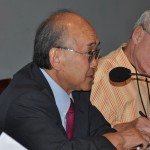- DETERRENCE: Broad powers seen for Obama in cyberstrikes
- DPRK: ISIS statement on North Korean nuclear test
- ENERGY SECURITY: Draft approval for new Indian nuclear site
- GOVERNANCE AND CIVIL SOCIETY: S. Koreans ‘indifferent’ to N. Korean nuclear threat
- CLIMATE CHANGE ADAPTATION: Climate change adaptation: institutional approaches for developing countries
- CLIMATE CHANGE AND SECURITY: Climate extremes: recent trends with implications for national security
Archives
Developing-country organizations and climate change adaptation

Developing-country organizations and climate change adaptation
by Saleem Janjua – Climate Change Adaptation Contributor
Climate change adaptation is rising as a management priority for public and private …
Impact on Nuclear Extended Deterrence

In this short report, Michael Schiffer raises three critical issues regarding extended deterrence in Northeast Asia: first, the security challenges extended deterrence is intended to address; second, the differing perspectives and interests of the players in the system; and finally, the interplay of shifting strategic considerations and a stable security settlement leading to a nuclear-free Korean Peninsula.
Michael Schiffer is a Senior Advisor and Counselor to the U.S. Senate Committee on Foreign Relations.
This report was originally presented at the New Approach to Security in Northeast Asia: Breaking the Gridlock workshop held on October 9th and 10th, 2012 in Washington, DC.
Nautilus Peace and Security Weekly – 7 February 2013
- DETERRENCE: Crisis bargaining and nuclear blackmail
- DPRK: What to expect from a North Korean nuclear test
- ENERGY SECURITY: US carbon emissions fall to lowest levels since 1994
- CLIMATE CHANGE ADAPTATION: Investing in resilience: Ensuring a disaster-resistant future
- AUSTRAL PEACE AND SECURITY: A maritime Balkans of the 21st century?
Practically Unusable: A North Korean Nuclear Device

Practically Unusable: A North Korean Nuclear Device
by Roger Cavazos – DPRK Contributor
Exactly when North Korea will detonate another device is anyone’s guess. But let’s remember…
Inter-Korean Normalization

In this concise report Haksoon Paik lists the current state of key issues preventing inter-Korean normalization, including the lack of national reconciliation, the continued threat of war and the persistent North Korean nuclear weapons program. He also provides a brief overview of the South Korean position on a Northeast Asian Nuclear Weapons Free Zone.
Haksoon Paik is currently the director of Inter-Korean Relations Studies Program and the director of the Center for North Korean Studies at the Sejong Institute in Korea.
This report was originally presented at the New Approach to Security in Northeast Asia: Breaking the Gridlock workshop held on October 9th and 10th, 2012 in Washington, DC.
Re-entry Vehicles and Rhetoric in Pyongyang

Re-entry Vehicles and Rhetoric in Pyongyang
by Peter Hayes – Deterrence Contributor
After 5 test firings (failures in 1998, 2006, 2009, 2012, and success, December 12, 2012) we know that DPRK long range rockets…
Nautilus Peace and Security Weekly – 31 January 2013
- DETERRENCE: U.S. military could redefine global-strike weapons
- DPRK: North Korea threatens nuclear test, more rocket launches in wake of tightened sanctions Harlan
- ENERGY SECURITY: Nicholas Stern: ‘I got it wrong on climate change – it’s far, far worse’
- GOVERNANCE AND CIVIL SOCIETY: Not all Peninsula issues China’s problem
- CLIMATE CHANGE ADAPTATION: Toward resilience: a guide to disaster risk reduction and climate change adaptation
- CLIMATE CHANGE AND SECURITY: Climate change and security threats: time to call a spade a spade?
Critical Military Issues: The Rebalancing Strategy and Naval Operations

Michael McDevitt assess US Force posture in East Asia. He concludes, “It is unlikely that China will halt development of what it considers necessary for its defenses. It is also clear that the United States does not intend to sit idly by and permit the introduction of military capabilities that could deny it access to East Asia in a time of conflict, and in peacetime undermine its credibility as capable ally…It will be a period of competing strategic concepts – assured access vs. denied access, complemented by the introduction of military capabilities by both sides necessary to accomplish those ends.”
Rear Admiral Michael McDevitt, US Navy (Ret.) is a senior fellow with CNA Strategic Studies.
This report was originally presented at the New Approach to Security in Northeast Asia: Breaking the Gridlock workshop held on October 9th and 10th, 2012 in Washington, DC.
Nautilus Peace and Security Weekly – 24 January 2013
- DETERRENCE: Nonproliferation nuclear forensics concept paper
- DPRK: Security Council condemns use of ballistic missile technology in launch
- ENERGY SECURITY: Speech gives climate goals center stage
- GOVERNANCE AND CIVIL SOCIETY: Park Geun-hye talks NK nukes with US delegation
- CLIMATE CHANGE ADAPTATION: Water supply risks and urban responses under a changing climate
- AUSTRAL PEACE AND SECURITY: PM looks to East Asia, digital threat, in new

